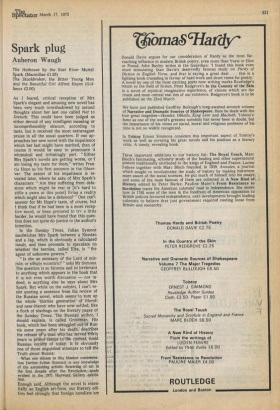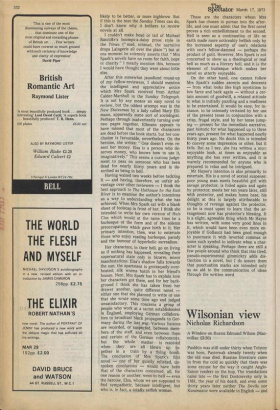Spark plug
Auberon Waugh
The Hothouse by the East River Muriel Spark (Macmillan £1.95) The Stockbroker, the Bitter Young Man and the Beautiful Girl Alfred Hayes (Gollancz £2.00) As I feared, critical reception of Mrs Spark's elegant and amusing new novel has been very much overshadowed by second thoughts about her last one called Not to Disturb. This could have been judged as either devoid of any intelligent meaning or incomprebensibly obscure, according to taste, but it received the most extravagant praise in all the usual quarters. If one approaches her new novel with the impatience which her last might have merited, then of course it would be easy to pronounce it whimsical and irritatingly pert. " Either Mrs Spark's novels are getting worse, or 1 am losing my taste for them," writes Francis Hope as his first sentence in the Observer. The extent of his impatience is revealed later, where he asks of Mrs Spark's characters: " Are they suffering from delusions which might be real or [it's hard to stifle a yawn at this point] living a reality which might also be a delusion?" One can't answer for Mr Hope's taste, of course, but I think that if he had been in a more receptive mood, or been prenared to try a little harder, he would have found that this question does not quite do justice to the author's intention.
In the Sunday Times, Julian Symons sandwiches Mrs Spark between a Russian and a Jap, which is obviously a calculated insult, and then proceeds to speculate on whether the heroine, called Elsa, is "the agent of unknown powers."
"Is she an emissary of the Lord of misrule, or sifnply eccentric? " asks Mr Symons.
The question is so fatuous and so irrelevant to anything which appears in the book that it is not even worth discussion — nor in deed, is anything else he says about Mrs Spark. But while on the subject, I can't re sist quoting a sentence from his review of the Russian novel, which seems to sum up the whole 'thirties generation of literati and near-literati who have now settled, like a flock of starlings on the literary pages of the Sunday Times. The Russian author, I should explain, is called Grossrhan. His book, which has been smuggled out of Russia some years after his death, describes the release of/'a man who'has served thirty years in prison camps to the cynical, timid Russian society of today. It is obviously one of those anguished attempts to tell the Truth about Russia: What one misses in this blanket condemnation [writes Julion Symons] is any knowledge
of the astonishing artistic flowering of art in the first decade after the Revolution, made evident in the 1971 Hayward Gallery exhibition.
Enough said. Although the novel is essentially an English art-form, our literary editors feel strongly that foreign novelists are likely to be better, or more highbrow. But if this is the best the Sunday Times can do, I don't know why it bothers to review novels at all.
I couldn't make head or tail of Michael Ratclifte's boomps-a-daisy prose style in
the Times (" mad, schmad, the narrative
drops Laingerie all over the place ") but at one moment he solemnly asserts that "Mrs Spark's novels have no room for faith, hope or charity." 1 mearly mention this, because I would have thought they were about little else.
After this somewhat jaundiced round-up of my fellow-reviewers, I should mention the intelligent and appreciative notice
which Mrs Spark received from Arthur Calder-Marshall in the Sunday Telegraph.
It is not by any means an easy novel to review, but the oddest attempt was in the New Statesman by a lady called Mary Ellmann, apparently some sort of sociologist. Perhaps through inadvertently turning over two pages together, Ellmann appears to have missed that most of the characters are dead before the book starts, but her conclusion is favourable, nevertheless. On the heroine, she writes: "One doesn't even resent her money. Elsa is a person who deserves money, who knows how to use it, imaginatively." This seems a curious judgement to pass on someone who has been dead for nearly thirty years and is described as being in hell.
Having waited two weeks before tackling It — and having, therefore, an unfair advantage over other reviewers — I think the best approach to The Hothouse by the East River is to examine the author's intentions as a way to understanding what she has achieved. When Mrs Spark sat with a blank sheet of foolscap in front of her, I think she intended to write her own version of Huis Clos which would at the same time be a burlesque of the form and of the solemn preoccupations which gave birth to it. Her primary intention, then, was to entertain those who enjoy reading burlesque, parody and the humour of hyperbolic surrealism.
Her characters, in their hell, go on living as if nothing has happened, revealing their supernatural state only in bizarre, minor manifestations: Elsa's shadow falls towards the sun; the apartment is grotesquely overheated; silk worms hatch in her friend's bosom. Next, Mrs Spark has to explain how her characters got there, and for her background I think she has taken from her drawer another, quite different novel — either one that she planned to write or one that she wrote some time ago and judged unsatisfactory. This concerns a group of people who work at a secret establishment in England, employing German collaborators to broadcast black propaganda to Germany during the last war. Various liaisons are recorded, or suspected, between members of the staff, and even between them and certain of the German collaborators, but the whole matter is resolved when they are all blown up together in a train by a flying bomb. The conclusion of Mrs Spark's first novel — one of her quietly relished, unspoken conclusions — would have been that of the characters concerned, all, for one reason or another, went to hell — even the heroine, Elsa, whom we are supposed to find sympathetic, because intelligent, but who is, in fact, a totally selfish woman. These are the characters whom Mrs Spark has chosen to pursue into the afterlife, and one must admit that the first novel proves a rich embellishment to the second. Hell is seen as a continuation of life on earth made more noticeably hellish only by the increased asperity of one's relations with one's fellow-damned — perhaps the product of guilt. However, Mrs Spark is not concerned to show us a theological or real hell so much as a literary hell, and it is the element of burlesque which makes her novel so utterly enjoyable.
On the other hand, one cannot follow Mrs Spark's sudden ascents and descents — from what looks like high mysticism to low farce and back again — without a certain amount of goodwill, a relaxed attitude to what is initially puzzling and a readiness to be entertained. It would be easy, for in• stance, to be intensely irritated by her use of the present tense in conjunction with a crisp, frugal style, and by her tense jump ing — present for the immediate narrative, past historic for what happened up to three years ago, present for what happened nearly thirty years ago. No doubt this is intended to convey some impression or other, but it fails. But as I say, she has written a mof:t enjoyable book, at times as enjoyable as anything she has ever written, and it is warmly recommended for anyone who is prepared to relax and be intrigued.
Mr Hayes's intention is also primarily to entertain. His is a novel of sexual suspense: poor young man meets beautiful girl with savage protector; is foiled again and again by protector; meets her ten years later, still with protector, and makes home base; his delight at this is largely attributable to thoughts of revenge against the protector, so he is most upset to learn that the ar rangement now has protector's blessing. It is a slight, agreeable thing which Mr Hayes has written, with some very good lines in it, which would have been even more enjoyable if Gollancz had been good enough to punctuate it with inverted commas or some such symbol to indicate when a character is speaking. Perhaps there are still a few people around who think that this tired, pseudo-experimental gimmickry adds distinction to a novel, but I do assure them that punctuation marks are intended only as an aid to the communication of ideas through the written word.



































 Previous page
Previous page